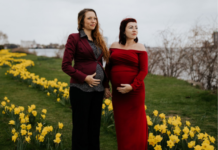
So many people who conceive twins are thrilled by the news. It’s a twofer, right? You only have to go through one pregnancy, but you get two babies out of it.
I was never one of those people. I never wanted a twin pregnancy–and when I found out that I was unexpectedly carrying twins and researched what a twin pregnancy would actually look like, I wanted them less.
But as soon as my wife and I saw the ultrasound of two little babies on the screen, I knew I wanted to create acceptance (and hopefully, eventually joy!) over the news. After all, two babies were now on the way, whether I wished it or not.
The first step of my process was to look into actual, factual data on the concerns (or positives!) of a twin pregnancy.
My research became very quickly enhanced with real-life experiences–I became wildly ill only three weeks into my pregnancy. (When we found out about the twins at the 8wk ultrasound, the initial reaction was shock, and the second reaction was, “Oh, that’s why I’ve been so sick”).
After symptoms progressively worsening to the point where I couldn’t even keep down ice chips and had lost 7% of my pre-pregnancy weight, an ER visit diagnosed me with hyperemesis gravidarum–a pregnancy disability more likely to happen to, you guessed it, twin moms.
From December to March, I had to go to the hospital (sometimes twice a week) for IV fluids and medication, and had to start prescription nausea meds just to keep down food.
 This all made me worried about the babies’ health, and that was backed up by data–a twin pregnancy put both me and the babies at increased risk for a variety of health issues. The babies are at a 60% chance of being preemies (for perspective, singleton pregnancies are at 8%). Twins are more at risk for long term health issues, including GI and respiratory issues; they are more at risk for brain bleeding or birth defects; and they are more likely to experience development and learning delays or disabilities and experience difficulty or loss with vision and hearing.
This all made me worried about the babies’ health, and that was backed up by data–a twin pregnancy put both me and the babies at increased risk for a variety of health issues. The babies are at a 60% chance of being preemies (for perspective, singleton pregnancies are at 8%). Twins are more at risk for long term health issues, including GI and respiratory issues; they are more at risk for brain bleeding or birth defects; and they are more likely to experience development and learning delays or disabilities and experience difficulty or loss with vision and hearing.
A quarter of twins upon birth need to go to the NICU. During pregnancy, I’m more likely to get gestational hypertension or diabetes, anemia, preeclampsia (which can be fatal to me, let alone the twins), and hemorrhage during delivery.
Hyperemesis alone increases risk of malnutrition and dehydration (which is dangerous even for non-pregnant people) and increases the risk of pregnancy complications or fetal death. At its worst, untreated hyperemesis can kill the mother.
You can imagine none of this was consoling to me. When I moved on to looking at my birth plan options, I was vastly dismayed over what I found available for pregnant twin moms in Michigan.
Years before I conceived, I knew how I wanted to give birth: an unmedicated vaginal water birth in a birth center (for the best of both worlds between medical options available but a comfy home-birth experience) with the people I wanted most to be there.
But in Michigan, no birth center will take a twin pregnancy. I would have to do a hospital (or homebirth, but many midwives won’t do home births for twins either, and with all the additional medical risks it felt medically irresponsible to me personally to pursue that). I tried and failed to get into a midwife program at Michigan hospitals: even when I would be giving birth in the hospital system, the midwives still wouldn’t take me as a client for liability’s sake.
The list of things that hospitals would want or require me to do piled up–one required that I get an epidural catheter, regardless of if I wanted an epidural (I didn’t); all wanted me to induce by 38 weeks; only one had water tubs available; and none would let me give birth in a labor and delivery room–I would be required to go to the operating room with only one of my support people and give birth on the operating table, rather than in a space and position that felt safe to me. One doctor even told me they’d require me to be on my back.
Fortunately hospitals can’t physically force you to be in a particular position, but knowing I’d have to fight with medical professionals during such a vulnerable painful time just to be able to move into a comfortable, better-for-me position felt so defeating.
The chance of c-sections is also far higher with twins. Some hospitals were straightforward about pushing a c-section in twins for convenience sake. Some told me if I choose to try vaginal, I’d be more at risk for a combined delivery, where one baby is vaginal and one is c-section (the worst of all worlds), because only some doctors would deliver a second twin breech and I would be at the mercy of whoever was on call when I went into labor. (There is compelling evidence that delivering baby A headfirst and baby B breech is not only very safe, but puts the risk of emergency c-section at 4%; versus if the doctor tries to turn the second twin to deliver headfirst, it ups the chances of an emergency c-section by closer to 50/50%.)
Knowing I could be forced into major abdominal surgery merely because a doctor didn’t want to be inconvenienced by a breech birth–and there was nothing I could do about it–was not helpful for radical acceptance, let me tell you.
But the twins were here, radical acceptance or not. And they would arrive this summer, whether I was ready or not. How could I hold space for the dialectical tension between “I never wanted this” and “…it’s happening!”?
The three coping mechanisms that helped me most were checking the facts (with both pros and cons), asking “what if?”, and explicitly envisioning the long term.
Checking the facts had certainly increased my anxiety over carrying twins, but it also helped ease the worst fears.
Yes, having a birth plan that even in its best case scenario is so drastically different from what I wanted that I’m practically guaranteed to experience birth trauma is horrible. But, I have a great therapist, I’ve worked through traumatic experiences before, and there’s no guarantee a singleton pregnancy wouldn’t have had a drastic detour either.
Yes, twins are more likely to experience many health risks during labor and recovery. But 99.4% of twins survive. If they’re born as tiny as 2lbs (very rare), their survival rate is still 85%. Although I was still worried, and felt all my concerns about health were valid, the facts encouraged that at the end of the day–even if there were obstacles to overcome and increased doctor appointments in our future for them or me–the babies and I would be okay.
Asking “what if?” helped to power down the cyclical anxiety thoughts. When I started crying over being forced into the hospital system, I asked, “What if a medical emergency happens and being in the hospital saves our lives? What if I actually have a great medical team there? What if I do need a c-section but it ends up being better for me and the babies?” Challenging these anxiety thoughts brought me closer to true acceptance.
These led me to the coping mechanism of envisioning the long term. All of my worries with twins exclusively focused on the pregnancy, birth, and infancy/toddler period of their lives. I realized that once the twins were older, I was genuinely excited about having multiple kiddos the same age. Although I fully anticipate that the sleep deprivation (promised to me to be a nightmare by parents who have just one kid) will be absolute hell for several years, and the pregnancy has already been hell with how sick I’ve been, that’s only a couple years out of the rest of our lives.

We have the rest of our lives to experience “double the giggles and double the grins, and double the trouble if you’re blessed with twins”.
It’s still societally taboo to express anything less than joy over the news of new life and motherhood, especially when you were deliberately trying to conceive. Upon hearing the news of the twins, folks always offer immediate congratulations.
I will often humorously tell them that condolences are as equally acceptable as congratulations–being authentic about my mixed feelings over “good” news feels important, for both myself and for other women. I’ve seen, read, and am now experiencing how society is so inclined to dismiss women’s fears or concerns over things they “should” be happy about–the “myth of motherhood” is a very real phenomenon that mothers should be expected to be happy and fulfilled due to the mere fact that they are a mother.
But it’s okay to experience grief as well as joy, burnout as well as blessings, stress as well as smiles. I would never have chosen to have twins, but I also know I’m not going to regret having them. Actually–I’m even getting excited about it.




